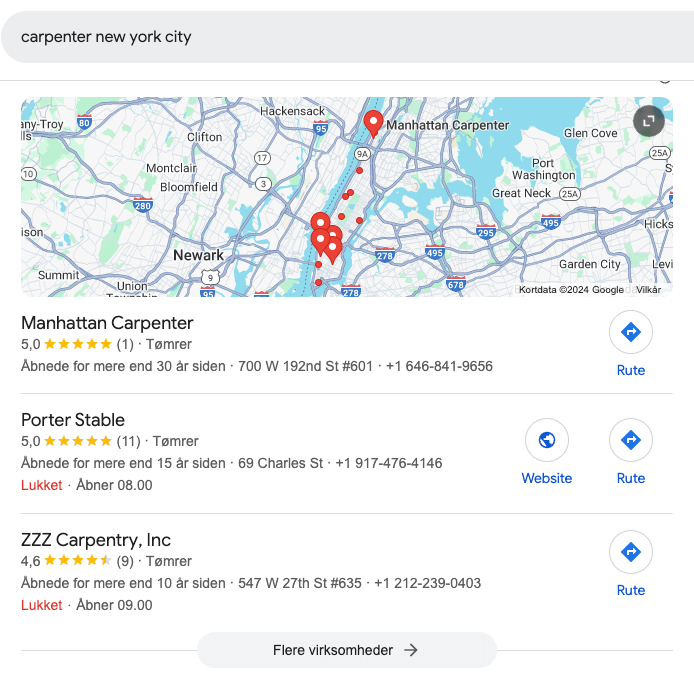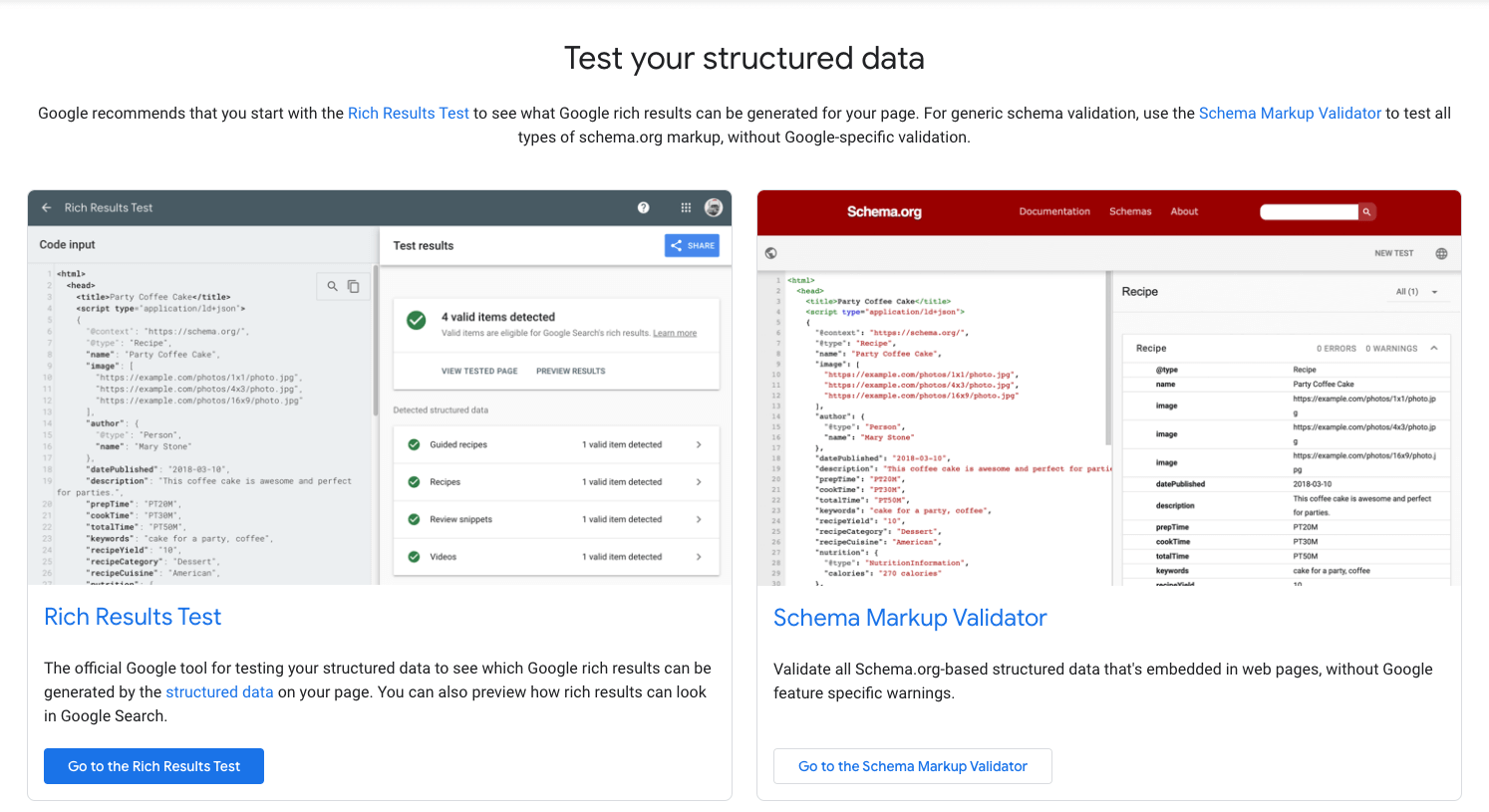As mobile phones and digital devices have become the primary source of information, local SEO is no longer just an add-on to a business’ online strategy – it’s a necessity. If you run a local business, it’s crucial to make sure your online presence is optimized to attract the customers searching for your products and services in your local area.
Local SEO, also known as local search engine optimization, is all about optimizing your business’ visibility in local search results. When someone searches for “restaurant near me” or “carpenter London,” Google will show results based on local search relevance, and that’s where local SEO comes in.
Locals, newcomers and tourists all search on Google when they need to find a craftsman, a place to eat and many other things. That’s why it’s important that your business appears when users search for your services.
Here’s a guide to local SEO – buckle up.
What is local SEO?

Local SEO is a discipline in digital marketing that is about improving the visibility of a business in local search results. Local search results are typically based on the geographical location of the person doing the search and the location of the business they are searching for.
This applies not only to physical stores such as restaurants, hairdressers and craftsmen, but also to businesses that offer online services but target a local audience, such as rental businesses.
The goal of local SEO is to get your business to appear high in search results when someone in your local area searches for the products or services you offer.
Local SEO is not a “one-off” exercise. It requires ongoing attention and adjustments to keep your business visible in local search results. From updating your Google Business Profile (formerly Google My Business) to have consistency in your NAP information (name, address and phone number), generating local backlinks and producing local content, a solid local SEO strategy will help your business attract more customers from your local area and establish you as a local authority.
The key is to stay focused on delivering value to your local customers and ensure that your online activities reflect your business and the local community you are in. With the right strategy, local SEO can be a huge source of new customers and greater visibility for your business.
Why is local SEO important?
Local SEO isn’t just a tool for small businesses – it’s essential for any business that has a physical location or wants to attract local customers. Here are some of the key reasons why local SEO is so important:
- Mobile search is on the rise: more and more people are searching for local services and products via their mobile phones. In fact, the majority of all searches today come from mobile devices.
- Local relevance leads to higher conversion: Local searches are often closer to a purchase decision. If a user searches for a “carpenter in East London”, they are likely looking for immediate help, making it a valuable search to rank high on.
- Improved brand credibility: When your business is visible in local search results, it is perceived as more trustworthy and reliable by users.
- Targeted marketing: Local SEO allows you to target customers in your local area and ensure they find you when they need your products or services.
Local SEO is about making sure your business is visible in the search results that appear when people in your local area search for products or services you offer. The difference between traditional SEO and local SEO is primarily that local SEO focuses on improving visibility for searches that include a geographical dimension.
For example, when a user searches for “restaurant in Copenhagen”, Google will prioritize results based on local relevance over global results. This targeted strategy increases your chances of attracting customers in your area and improves the possibility of increased sales and brand recognition.
It’s important for your business to be found when potential customers search for your services in your service area. Your competitors are visible in local search results, so if you’re not, you’re missing out on customers.
A local search doesn’t always include a city name in the search. “Near me” is a phrase often used by users to find what they are looking for. Keywords like “carpenter” are also a local search, even if no city is specified.
Google will prioritize showing local carpenters from your geographic location over showing carpentry companies from Aarhus if you search from Copenhagen. It is therefore also important that you track your local rankings when it comes to local search intent.
In any rank tracker, you’ll see an average position for your keyword if it’s tracked nationally by default. This gives you a false picture of how you actually rank when people search in your local area, who are the people you are interested in.
How to do local SEO?
Mastering local SEO requires you to optimize both your company’s online profile and the information that search engines use to index and display your business. Here are the key steps to get started:
1. Create and optimize your Google Business Profile
Google Business Profile is one of the most important tools you can use to optimize your local SEO. It’s a free tool from Google that allows you to manage how your business appears in Google Search and Google Maps. Here are some tips for optimizing your GMB profile:
- Accurate NAP (Name, Address, Phone Number): Make sure your business name, address and phone number (NAP) are correct and consistent everywhere online. This includes your website, Google Business, local listings, Krak and similar, business directories and more.
- Fill in all the details: Add accurate opening hours, images, a description of your business and relevant categories.
- Encourage reviews: Local reviews have a huge impact on your visibility. Make sure your customers leave reviews via Google as it improves your credibility and ranking. Google shows businesses with more and better reviews higher in Google Business results.
Understand Google Business
One of the most important components of local SEO is Google Business, which allows businesses to create a free business profile that can be displayed in Google Search and Google Maps.
When a user performs a local search, your Business profile can show up as one of the first results in what’s called the “local pack” – a special search box that lists local businesses and their contact information.

To optimize your Google Business Profile, make sure that all details are filled in accurately. This includes the business name, address, phone number (known as NAP), opening hours, website address, and not least, high-quality images that present your business.
Use the tool actively by posting updates about events, offers or news that will keep your profile fresh and engaging for potential customers. It’s also important to encourage your customers to write reviews, as positive reviews can improve your visibility in local searches and increase your credibility.
Create Google Business Profile
Go to google.com/business and click “Manage now”.
- Enter your business name
- Click “Yes” to allow your business to appear on Google Maps and Google Search
- Enter address
- Select service areas
- Select your business category
- Enter phone number (SMS might be received, so business phone for calls only is a no-go) and enter website.
- Click “Finish”
- Select the verification method:
1. Phone call
2. Physical letter
3. SMS
Choose the option you are given or whatever suits you.
Once confirmed, your Google Business is online.
2. Local On page SEO
OnPage SEO is just as important for local search engine optimization as it is for traditional SEO. You need to make sure your business website is optimized to reflect your local focus:
- Include local keywords: Use local keywords strategically on your website, including in titles, meta descriptions and headings. For example: “carpenter in New York” or “best café in Manhattan.”
- Mobile-friendliness: Since many local searches are done on mobile devices, it’s crucial that your website is responsive and fast on mobile phones.
- Tailored content: Local content is key to ranking well. Write blog posts and update your site with relevant information that speaks directly to your local audience.
3. Optimize your business with local directories

Local business directories such as Yelp, YellowPages and Foursquare can play an important role in your local SEO strategy. I’m sure you know a lot more and maybe even some that is an even better fit in terms of relevant niche directories.
Being listed in these directories not only provides backlinks to your website, but it also strengthens your business credibility online. Make sure your business information is correct and up-to-date in all relevant directories.
If there are local business directories in your area, contact them and get listed – even if they don’t provide a backlink. Get seen, mentioned and talked about in local news media as well as business directories.
4. Local backlinks
Backlinks from local businesses and organizations can give you a big boost in your local SEO. Local links signal to Google that your business is relevant to your local community, which can help you rank higher in local search results.
- Collaborate with local media: Get featured in local newspapers or blogs and make sure they link to your website.
- Sponsor local events: If you sponsor an event in your local area, you can often get a backlink from the organizer’s website. It could also be the local sports club where you can be listed as a sponsor and get a link from the club’s website in exchange for sponsoring new balls, shirts or something else.
- Local partnerships: Partner with other local businesses and make agreements to link to each other’s sites. If there are city associations or similar in your area, this is also a great option.
Use a backlink checker to keep up with your incoming links.
5. Local reviews
Local reviews are one of the most effective ways to build credibility and trust with potential customers.
Reviews from existing customers act as social proof and can convince new customers to choose your business. Here are some steps to manage reviews:
- Ask for reviews from satisfied customers: Ask your customers to leave reviews on Google or other review platforms like Trustpilot.
- Respond to reviews: Whether the reviews are positive or negative, respond professionally and gratefully. This shows that you value customer feedback.
- Highlight reviews on your website: Display the best reviews on your website to build credibility with new visitors.
6. Use local Schema markup

Schema markup is structured data that helps search engines better understand the content on your website.
By implementing Schema Markup, you can provide search engines with detailed information about your business, which is especially valuable for local SEO.
Using Schema Markup also increases the possibility of displaying your results as a feature snippet, or highlighted snippet.
Usage in local SEO:
- By using Schema Markup, your business can show up in local search results with extra information such as address, phone number and opening hours.
- Schema Markup allows search engines to display rich snippets, which can include reviews, ratings and other details directly in search results, which can increase click-through rates.
- This ensures that search engines display accurate and up-to-date information about your business.
Types of Schema Markup for local SEO:
- LocalBusiness: Provides basic business information such as name, address and phone number.
- GeoCoordinates: Adds precise geographical coordinates to your business location.
- OpeningHours: Informs about your opening hours.
- AggregateRating: Shows average reviews from customers.
Optimize your website for local keywords with local landing pages
First and foremost, it’s important that you analyze the market and search queries in the areas you serve. Find out what people need to know and provide them with answers, knowledge, prices and availability information.
If you have businesses in different cities or work in a larger area with cities of a certain size, it’s a good idea to create separate landing pages for each city.
Make sure each page has unique content describing your product/service and include your local keyword in page titles, H2, H2 and H3, meta descriptions.
In practice, this means that you can create the following pages if you operate throughout the whole of New York:
- carpenter.com/albany
- carpenter.com/buffalo
- carpenter.com/rochester
- carpenter.com/yonkers
- carpenter.com/new-york
Each landing page targets a local keyword, such as “carpenter New York” which should appear in the page title, H1 and 60-70% of your H2s as standard.
How to track local keywords?
To understand how your local SEO strategy is performing, it’s important to track your keywords and their rankings by location. By monitoring how well your local keywords are performing in Google, you can adjust your strategy and focus on the areas that need improvement.
The easiest way to track local keywords is by using Morningscore’s local rank tracker. All you need to do is create a free trial, add your website and finally add your keywords and select the city or cities you operate in. It’s as simple as that and is one of the reasons that Morningscore is being mentioned as one of the best SEO tools for small businesses.
This way you can track how you rank in your relevant neighborhood rather than looking at a national average, which will often show a lower position because you don’t rank high in the other end of the country, which is not relevant to you anyway.
Local advertising and paid strategies
For businesses that want faster results, paid ads can be an effective way to get visibility in local search results. Google Ads allows you to target customers based on their geographical location, allowing you to reach local customers who are ready to buy.
Lastly: Get started with more local traffic
Local SEO is a crucial strategy for businesses that want to attract more customers from their local area. By optimizing your Google Business profile, creating relevant and localized content, building local backlinks and managing reviews, you can improve your business’ visibility and credibility in local search results.
For small businesses and local service providers, local SEO is the key to success. It’s about making it easy for your customers to find you when they need you – and that’s exactly what local SEO can help with.

